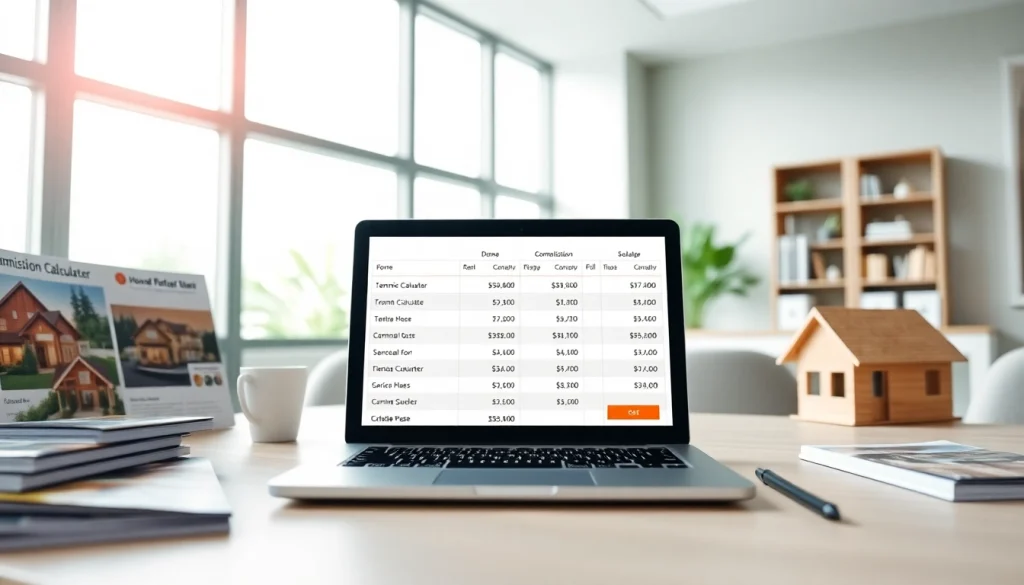Calculate Real Estate Commission in BC: Your Essential Commission Calculator Guide

Understanding Real Estate Commissions in BC
1. What Are Real Estate Commissions?
Real estate commissions are fees paid to real estate agents for their services in facilitating the sale or purchase of properties. This fee is typically a percentage of the property’s sale price. In British Columbia (BC), these commissions are usually calculated as a percentage of the total transaction value, and they are integral to the business model of residential real estate transactions.
Commissions generally cover various services provided by realtors, including property valuation, marketing, negotiation, and closing processes. Understanding how these commissions work is crucial for both buyers and sellers as it impacts their financial outcomes during real estate transactions.
2. Who Pays the Commission in BC?
In BC, it is predominantly the sellers who pay the real estate commission. When a property is sold, the seller’s agent (listing agent) often charges a commission that is typically deducted from the sale proceeds. This commission is then split with the buyer’s agent. The total commission can vary, but it generally ranges around 5% to 7% of the property’s selling price.
Interestingly, buyers in BC usually do not bear the brunt of the commission directly. Instead, the costs associated with commissions are factored into the overall price of the home. However, it’s important for buyers to recognize that the commission impacts the seller’s pricing strategy, which can indirectly affect the buyer’s purchasing decisions.
3. Common Commission Structures Explained
Real estate commission structures in BC can vary, but they often follow specific patterns. The most prevalent structure consists of a tiered system.
- Tiered Commission: This approach often looks something like this: 7% on the first $100,000 of the sale price, followed by 2.5% on the remaining balance. For example, if a home sells for $500,000, the commission would be calculated as 7% of $100,000 ($7,000) plus 2.5% of the remaining $400,000 ($10,000), totaling $17,000.
- Flat Fee Structure: Some agents might offer a flat fee for their services irrespective of the property’s price. This structure is less common but can be appealing for sellers of higher-end properties where traditional commission rates would be exorbitant.
- Negotiated Rates: In many cases, commissions can be negotiated between the seller and the agent. It’s not uncommon for agents to reduce their rates to secure a listing, especially in a competitive market.
Getting Started with a Real Estate Commission Calculator
1. What is a Real Estate Commission Calculator BC?
A Real Estate Commission Calculator BC is an online tool that allows homeowners and buyers to estimate the commission costs associated with real estate transactions in British Columbia. These calculators take into account the sale price of the property, the commission rate agreed upon, and other relevant factors.
Using a commission calculator can greatly assist in understanding the financial implications of selling or purchasing a property. Knowing potential commission amounts up front enables sellers to effectively determine their net proceeds from a sale, while helping buyers anticipate potential costs associated with purchasing a home.
2. How to Use the Calculator Effectively
To use a real estate commission calculator effectively, one must follow these steps:
- Enter the Property Sale Price: Input the estimated selling price of the property. This is typically the most essential element for calculating commissions.
- Select the Commission Rate: Choose the commission percentage as agreed upon with the real estate agent. If unsure, consider using typical rates prevalent in the area.
- Review Results: After entering the necessary information, the calculator will provide an estimate of the commission fees, as well as net proceeds for the seller based on the calculated fees.
3. Inputting Property Details and Understanding Outputs
When using a real estate commission calculator, be aware that the inputs greatly affect the outputs. The property sale price and the commission rate are the most impactful data points.
The output will typically include:
- Total Commission Fees: This indicates how much of the sale price will be allocated to pay the realtor.
- Net Proceeds: This is the amount the seller will retain after paying the entire commission, which provides an essential understanding of financial outcomes from the sale.
Factors Affecting Real Estate Commission Rates in BC
1. Market Conditions and Trends
The real estate market condition plays a significant role in commission rates. In a seller’s market, where demand exceeds supply, agents may charge higher commissions. This is because of increased competition among buyers, which can lead to significantly higher selling prices.
Conversely, in a buyer’s market, where there are more homes available than buyers, agents might reduce their fees to attract sellers. Tracking market trends and understanding your local market conditions can provide leverage when negotiating commission rates.
2. Property Location and Type
The location of a property can also impact commission rates. In metropolitan areas or desirable neighborhoods, standard commission rates might be higher due to increased competition among agents and higher property values. Different types of properties may also have different commission structures. For instance, commercial properties might typically incur different rates compared to residential homes.
3. Agent Experience and Services Offered
Experienced agents may charge higher commission rates, often justifying their rates with a proven track record, extensive marketing strategies, and broader networks. Conversely, newer agents might offer lower rates as they work to build their portfolios.
The range of services an agent offers also influences the commission. Full-service agents typically charge more since they handle everything from marketing to the final closing, while those offering limited services might charge a lower fee.
Common Questions About Real Estate Commissions
1. What Are Standard Rates for Realtors in BC?
In BC, the standard commission for realtors ranges between 5% and 7% of the sale price. However, these rates can vary depending on the agreement between the seller and agent, as well as market conditions. It’s important for sellers to shop around and compare rates from various agents to ensure they receive fair service at a reasonable cost.
2. Can You Negotiate Commission Fees?
Yes, commission fees are often negotiable. Many agents are willing to adjust their rates, especially when competing for your business. It’s advisable to approach the negotiation with a good understanding of the local real estate market and what other agents are offering. You can potentially negotiate a lower commission if you’re able to present competing offers.
3. How Do Commissions Impact Home Sellers?
Commissions directly impact the net proceeds that home sellers receive after the sale. Understanding and calculating potential commissions allows sellers to set appropriate listing prices. A clear grasp of these fees is essential to strategizing the sale, ensuring they gain maximum profitability from their property transaction.
Maximizing Returns When Selling with Calculators
1. Using the Calculator to Compare Agent Fees
One effective way to maximize returns when selling a property is by comparing agent fees using a real estate commission calculator. By inputting various commission rates, sellers can visualize how different commissions will affect their bottom line. This comparison can help sellers decide whether to choose a full-service agent or one offering limited support at a lower rate.
2. Preparing for a Successful Sale in BC
Preparing for a successful sale involves more than just understanding commissions. Sellers should enhance their property’s appeal to ensure a quicker, more profitable sale. This might involve home staging, conducting necessary repairs, or even getting a pre-sale home inspection. Each of these investments can have a direct impact on the final sale price, potentially offsetting higher commission costs.
3. Additional Tools for Home Sellers
Aside from commission calculators, sellers can utilize a variety of additional tools to assist them in the sales process. Market analysis reports, property management services, and professional appraisals can all provide valuable insights into enhancing the profitability of a sale. Technology tools such as virtual tours and professional photography can also significantly increase the appeal and marketability of a home.






